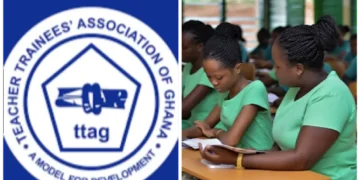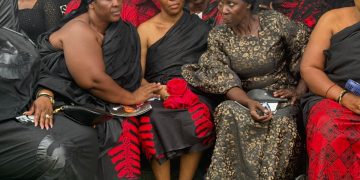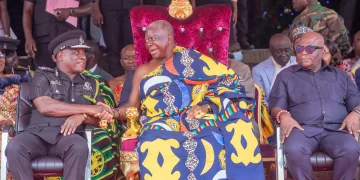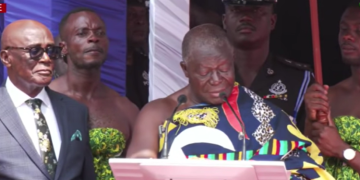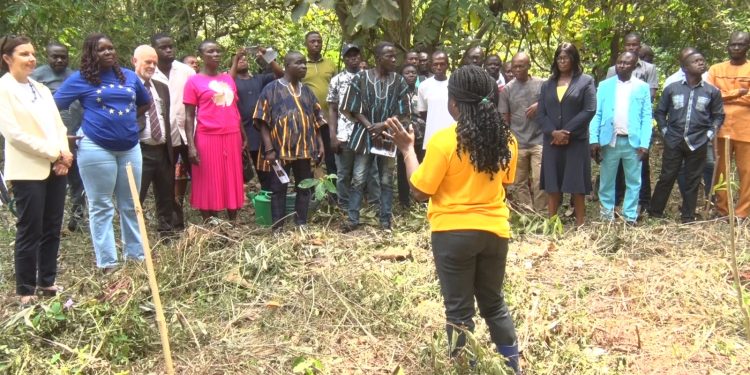The Ghana Institute of Foresters (GIF) has warned that Ghana’s forests are facing alarming levels of degradation driven largely by illegal mining, urging government to intensify enforcement and restore damaged reserves.
The call was contained in a communiqué issued at the Institute’s 28th Annual General Meeting (AGM), held on 6 November 2025 at the Amonoo-Neizer Conference Centre at KNUST, Kumasi.
The event, which brought together about 150 members, was chaired by Prof. Kyereh Boateng of the Faculty of Renewable Natural Resources, with KNUST’s Pro Vice-Chancellor, Prof. David Asamoah, representing the Vice-Chancellor as Special Guest of Honour.
Delivering the keynote address, Chief Executive of the Forestry Commission, Dr. Hugh Brown, highlighted the escalating threat of mining in forest reserves and the dangers foresters face while combating the menace.
Multimedia Group journalist, Erastus Asare Donkor, also presented data showing that over 60 percent of Ghana’s water bodies have been polluted by small-scale mining operations, while several forest reserves have suffered severe degradation.
In another presentation, Mr. Mustapha Seidu of the Nature and Development Foundation discussed the controversial L.I. 2462, the regulatory challenges surrounding mining in forest reserves, and government’s ongoing efforts to revoke the law.
Spatial analysis discussed at the AGM showed that between 2015 and 2024, open forests increased from 4.35 million hectares to 5.37 million hectares, while closed forests dropped from 1.45 million hectares to 1.02 million hectares—evidence, GIF said, that Ghana is experiencing forest degradation rather than outright deforestation.
According to the Institute, 50 protected areas—including 49 forest reserves and the Bui National Park—have been affected by mining. At the start of 2025, nine forest reserves were reportedly under the control of armed miners, a number that declined to five by October. Among the worst-affected reserves are the Apamprama, Offin Shelterbelt, Oda River, Tano Anwia and Tano Nimri reserves.
Foresters attempting to stop illegal mining have faced violent attacks, with some losing their lives or sustaining severe injuries. Yet, the Institute noted, out of 1,190 illegal miners arrested between 2023 and October 2025, only 35 have been successfully prosecuted.
GIF commended government for steps taken to tackle the problem, including the revocation of about 300 small-scale mining licences and the presentation to Parliament of a new Legislative Instrument to replace L.I. 2462 and its amendment, L.I. 2501.
However, the Institute criticised the February 2025 presidential directive to seize and not burn excavators found in forest reserves, arguing that seized equipment is often difficult to transport from remote areas and sometimes ends up back in the hands of illegal miners.
GIF identified greed, political interference, weak enforcement, corruption, and the involvement of foreign nationals—particularly Chinese operators—as major obstacles to ending illegal mining.
The AGM adopted several recommendations, including the immediate resumption of burning excavators found in forest reserves, the enactment of a new law allowing only strictly controlled deep cast mining in designated production forests, and a nationwide intensification of public education on the impact of galamsey.
The Institute also condemned the recent attack on the National Anti-Illegal Mining Operations Secretariat (NAIMOS) at Hwidiem, where illegal miners were forcibly released. It expressed strong support for proposals to transform the Forestry Commission into a paramilitary institution to better confront armed miners.
In its closing remarks, GIF urged Ghanaians not to “normalize the abnormal,” stressing that nothing justifies the destruction of forests and water bodies. The Institute reaffirmed its commitment to collaborating with stakeholders to promote sustainable mining practices.
Source: www.kumasimail.com












